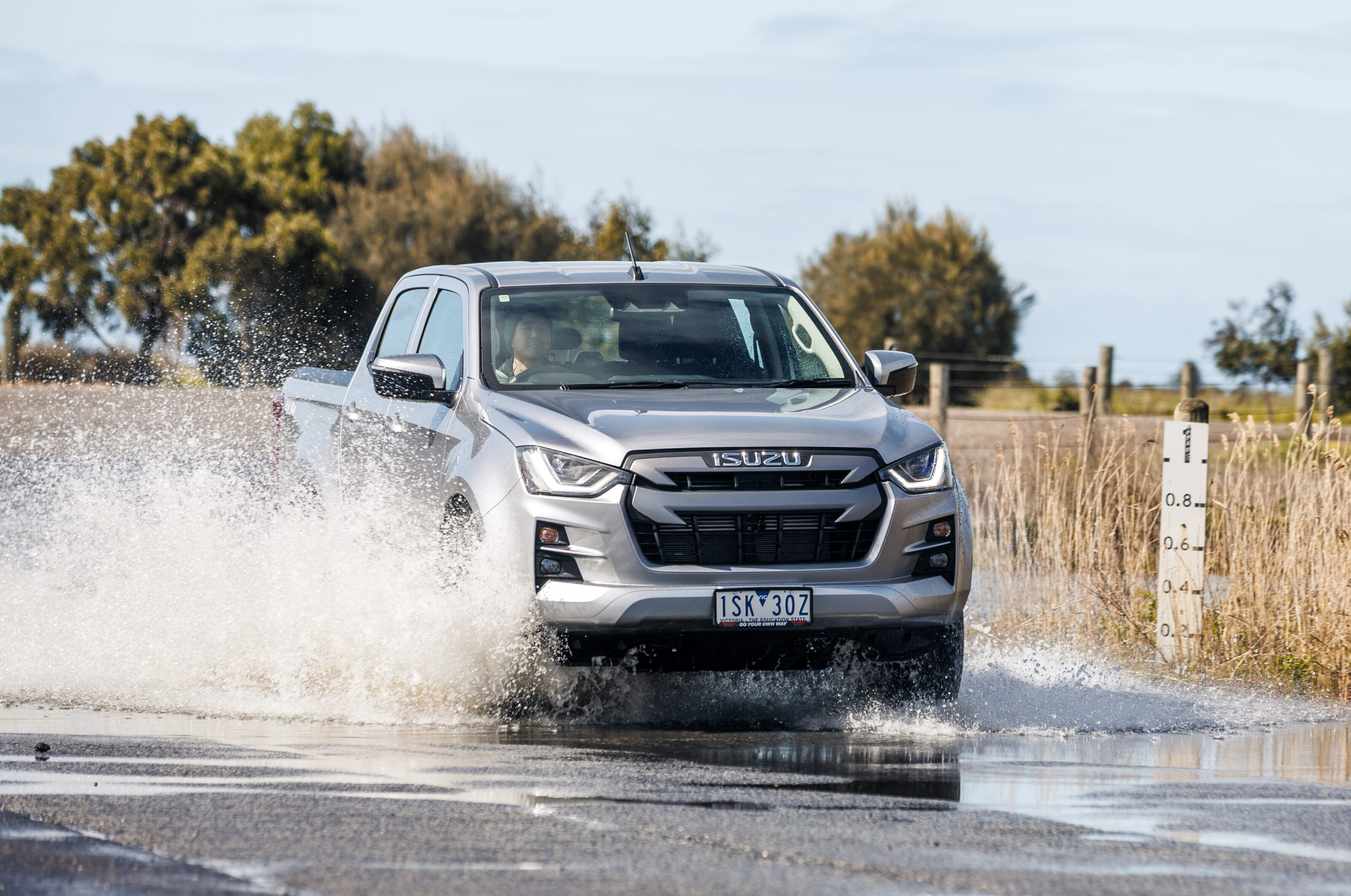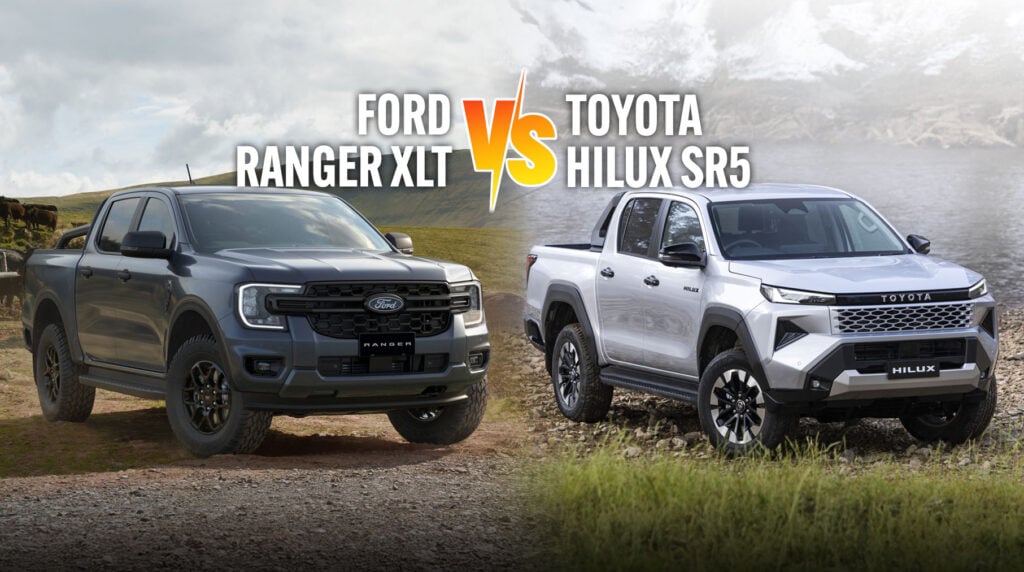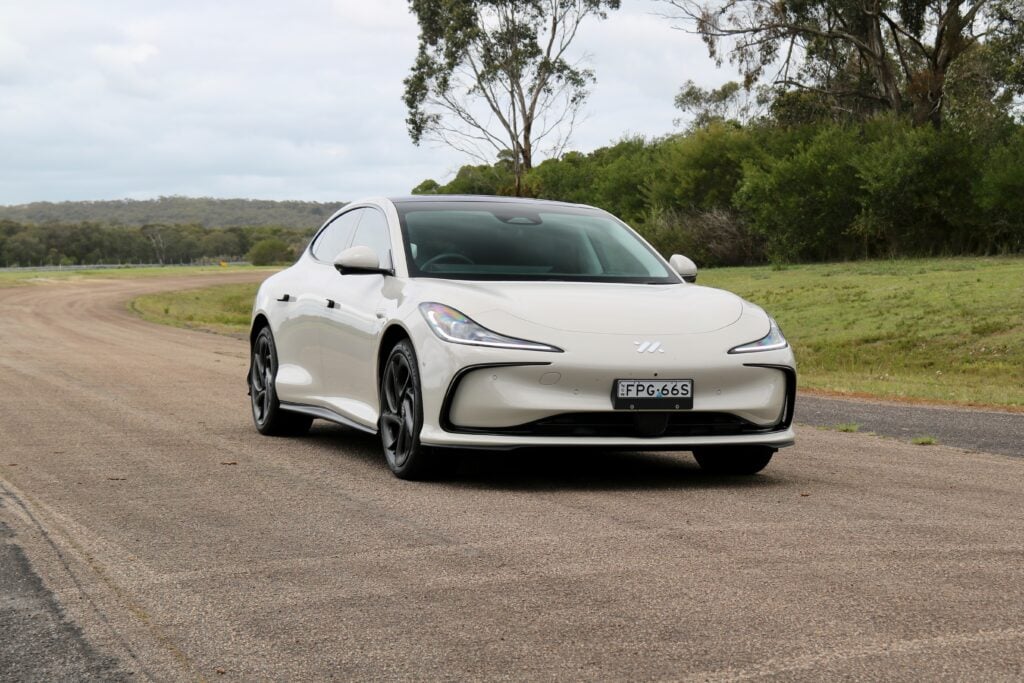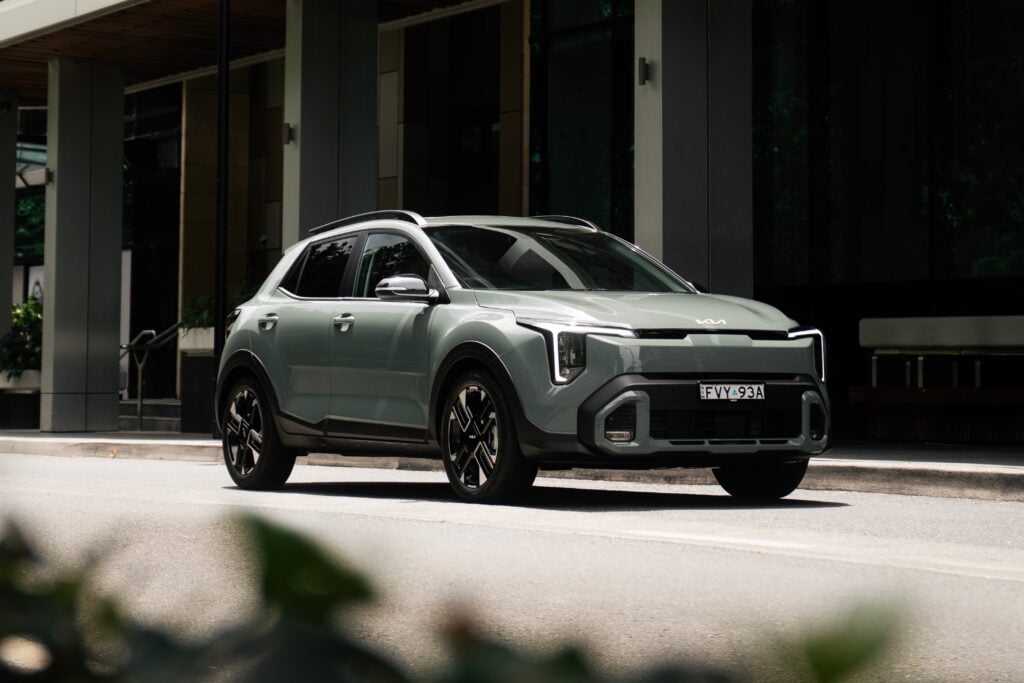Score breakdown
The popular Isuzu D-Max frequently punches above its weight in terms of value, with the mid-spec LS-M positioned particularly. keenly as an appealing and affordable offering within the increasingly active diesel 4×4 dual-cab market.
MY23 Isuzu D-Max range updates include minor cosmetic and packaging revisions, including a new grille (finished in black and grey for the LS-M) appearing across the range, along with dark grey trim around the LED foglights and LED taillights, and new cloth upholstery inside.
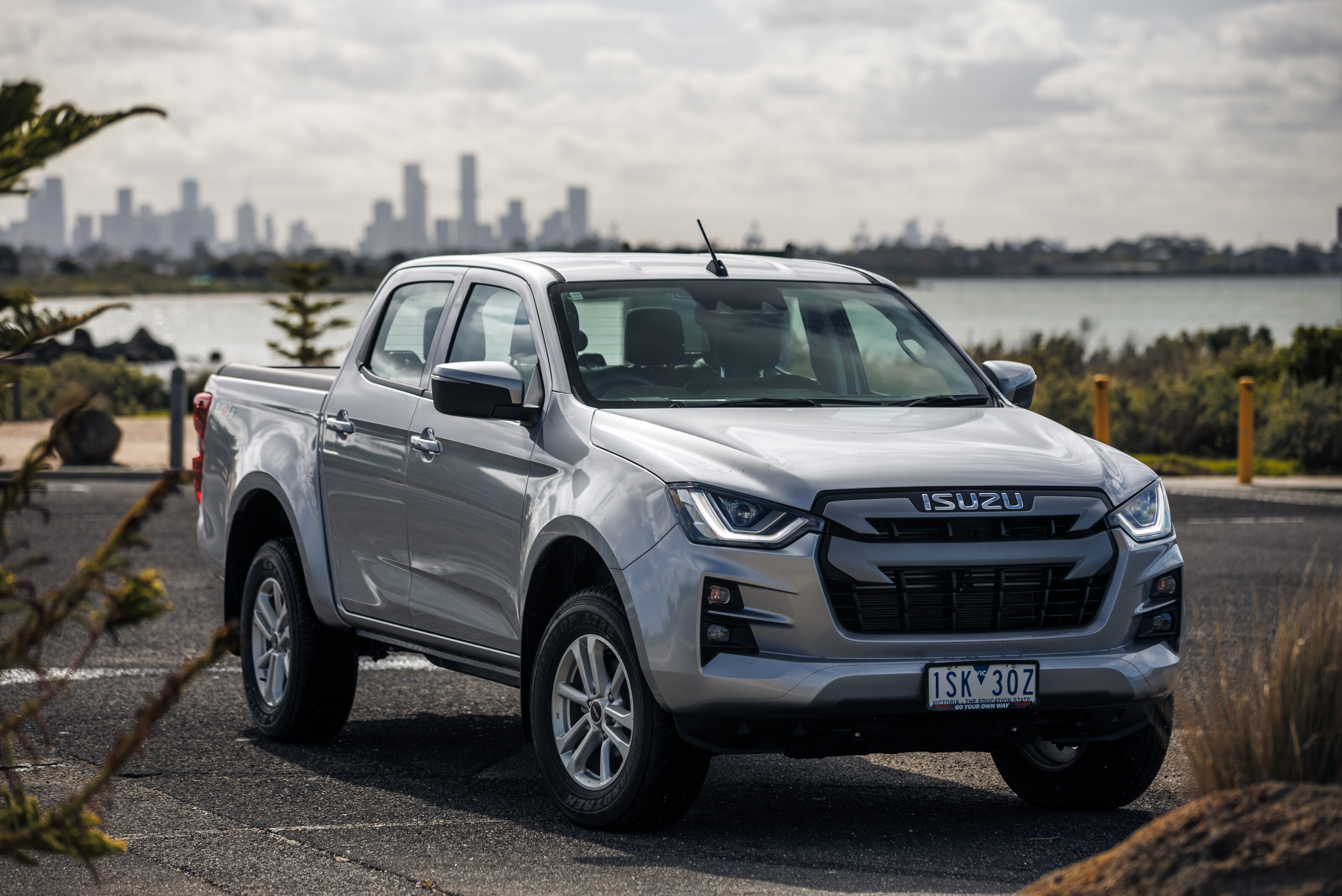
Images show the MY22 Isuzu D-Max, which mechanically presents, and is priced, identically. We’ll bring you a review of the MY23 D-Max soon.
And the price is right, asking mid-$50Ks for the six-speed automatic version tested here, netting buyers a lifestyle-ready five-seat ute with 4×4 capability and 3.0-litre turbo-diesel grunt. But is it the one you should go for?
JUMP AHEAD
- How much is it, and what do you get?
- How do rivals compare on paper?
- Interior comfort, space and storage
- What’s the payload like and is the tray practical?
- What’s it like for towing?
- What’s it like to drive?
- How is it on fuel?
- How safe is it?
- Warranty and running costs
- What about the 2023 update?
- VERDICT
- Specifications
How much is it, and what do you get?
| Body | 4-door, 5-seat dual-cab ute |
|---|---|
| Power | 140kW |
| Torque | 450Nm |
| Transmission | 6-speed automatic |
| Drive | four-wheel |
| Fuel consumption | 9.65L/100km |
| Price | $55,300 + on-road costs |
The D-Max range begins at just $32,200 before on-road costs for the fleet-spec entry-level 4×2 single-cab D-Max SX, fitted with a manual transmission and 1.9-litre turbo-diesel four-cylinder.
For private, family and/or lifestyle buyers, however, the mid-spec LS-M likely represents the sweet spot, as the most affordable means of netting Isuzu’s 4×4 dual-cab with the bigger 3.0-litre turbodiesel four-cylinder.
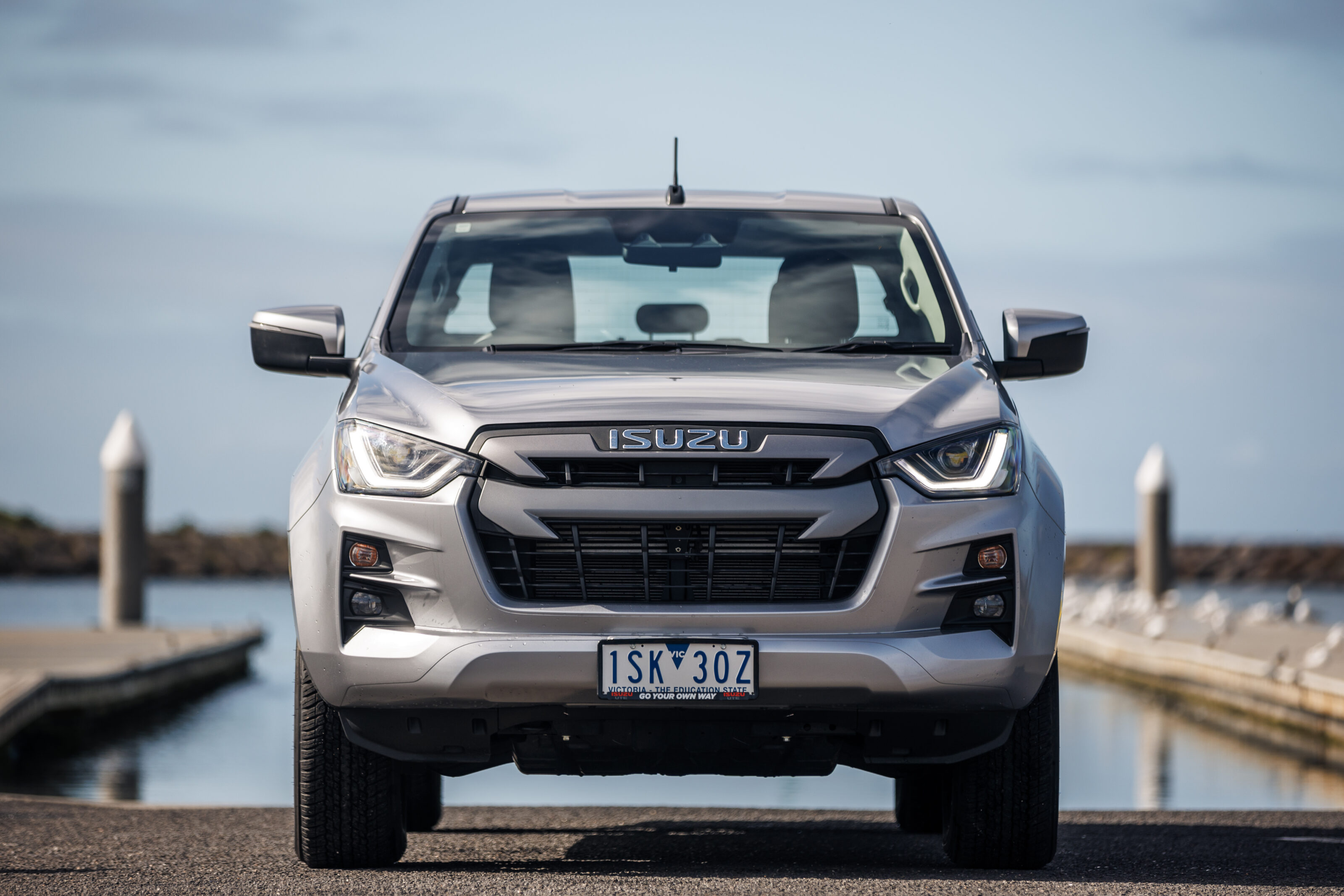
The six-speed manual D-Max LS-M asks $53,300 before on-road costs, but it’s the six-speed auto, driven here, that most buyers will be eyeing, asking $55,300 (before on-road costs).
Standard features include 17-inch alloy wheels, auto bi-LED headlights with auto levelling and auto high beam, LED daytime running lights and foglights, 7.0-inch infotainment screen, wireless Apple CarPlay and wired Android Auto, DAB+ digital radio, six-speaker sound system (up from four in lower variants), rain-sensing wipers, power windows and mirrors plus more.
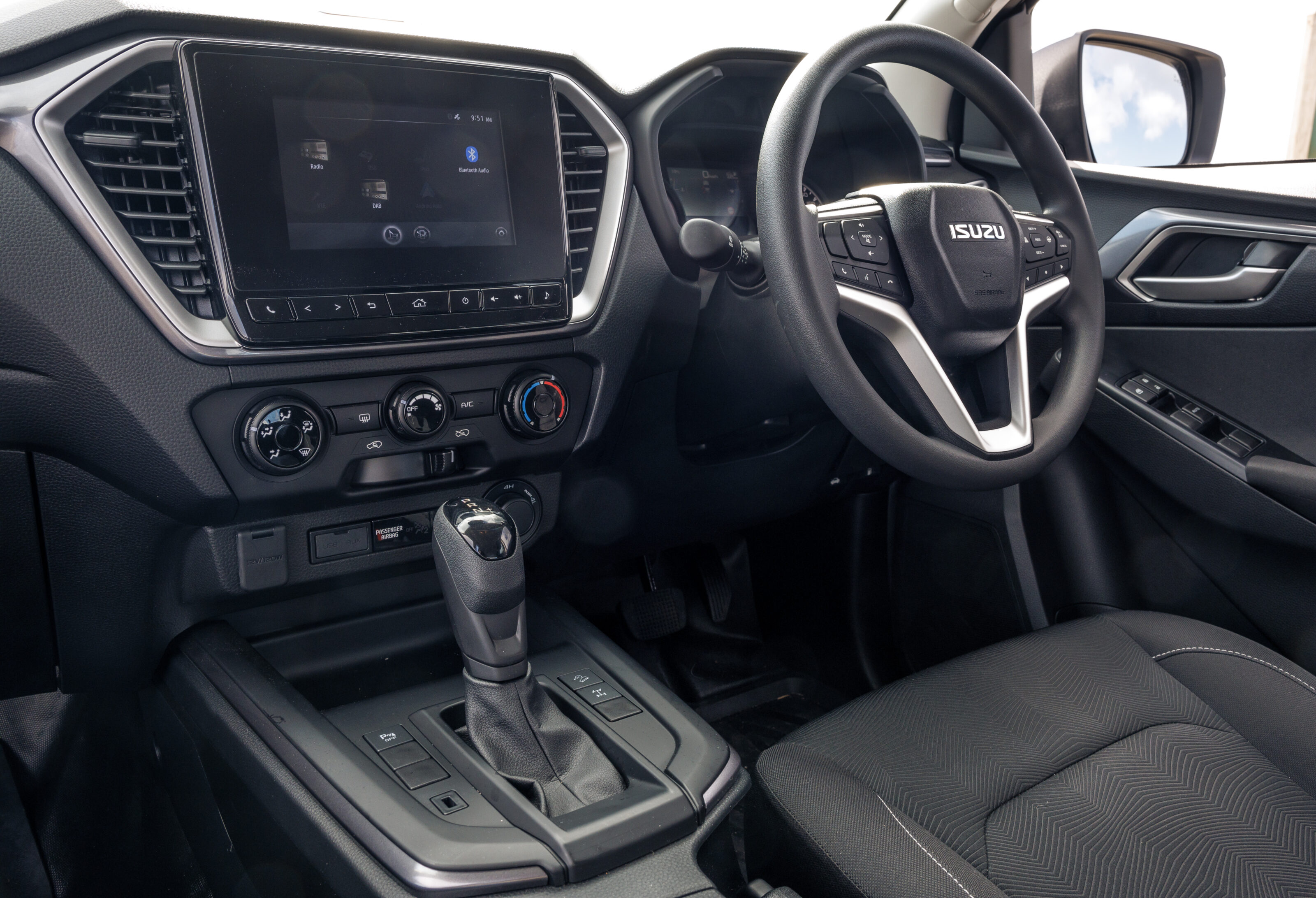
Standard safety equipment includes lane-keep assist and adaptive cruise control (both auto only, not compatible with manual vehicles), lane departure warning, blind-spot monitoring, rear cross-traffic alert, traffic sign recognition and driver attention alert.
MY23 updates arriving this month for the D-Max LS-M, in particular, include a new grille, dark grey foglight and taillight surrounds, new cloth upholstery, tailgate gas struts, an additional USB port for the second-row seats and new-look cloth upholstery.
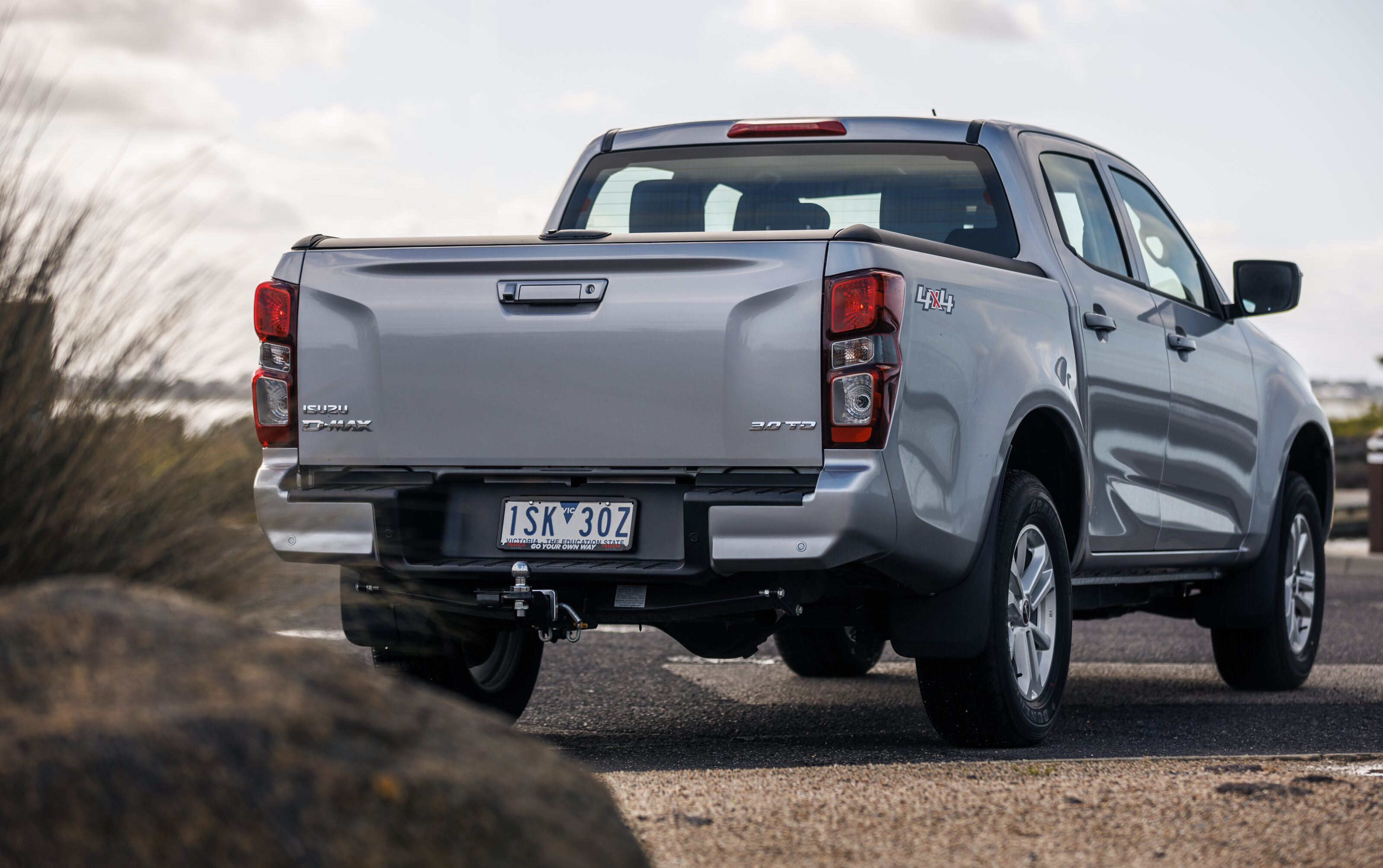
For those who seek to personalise their D-Max, Isuzu Australia offers no shortage of genuine accessories, from rugged bullbars ($3999-$4299), nudge bars ($1199), fender flares ($1249-$1499), both hard and soft tonneau covers ($768-$3599), manual and auto-electric roller tonneau covers ($3099-$3899), with various roof, rack and ladder mounting kits for extra stowage.
How do rivals compare on paper?
There are a lot of rivals to consider at this position and price point, with the nation’s favourites – the Toyota HiLux and Ford Ranger – both swinging in with the popular HiLux SR and Ranger XLS, for $52,795 and $54,330, respectively (both before on-road costs).
Mazda’s D-Max twin-under-the-skin BT-50 is also offered in second-from-entry XT Automatic trim, for $53,490 before on-road costs.
Nissan’s mid-spec Navara ST also closely matches the D-Max on spec, features and price, by wearing a $54,780 (before on-road costs) sticker price.
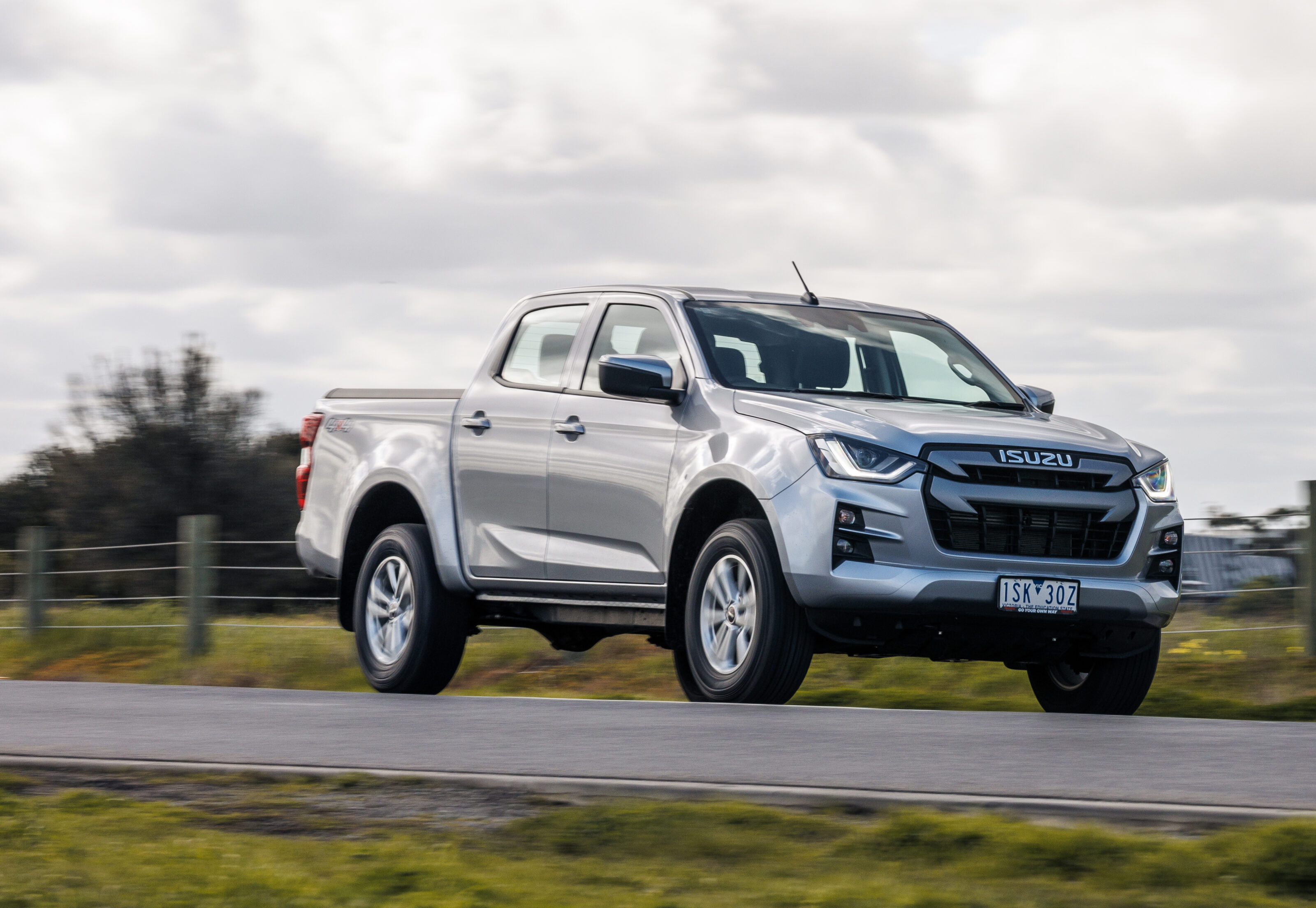
The D-Max has been quietly moving upstream since it first launched locally. As the sector grew, and buyers demanded more feature-filled vehicles, this third-generation D-Max, launched in 2020, took a decidedly upmarket step and is now priced in line with heritage names such as Toyota, Ford and Mazda, yet never lost its value-minded appeal.
Subsequently, year-on-year sales have been trending northward over the past five years and culminated in an outright sixth-placed finish in the 2021 sales charts where it sold 25,117 units. The HiLux and Ranger took out first and second, with Mitsubishi’s Triton following behind in ninth.
Interior comfort, space and storage
While stepping up from the base D-Max SX to the LS-M secures buyers the ‘big-block’ 3.0-litre diesel mill and 4×4 drivetrain, stepping into the LS-M’s cabin is where the ute’s more workmanlike roots begin to emerge.
A hard-plastic dashboard and a polyurethane steering wheel may be mood dampeners at this price for some, but it’s all about perspective.
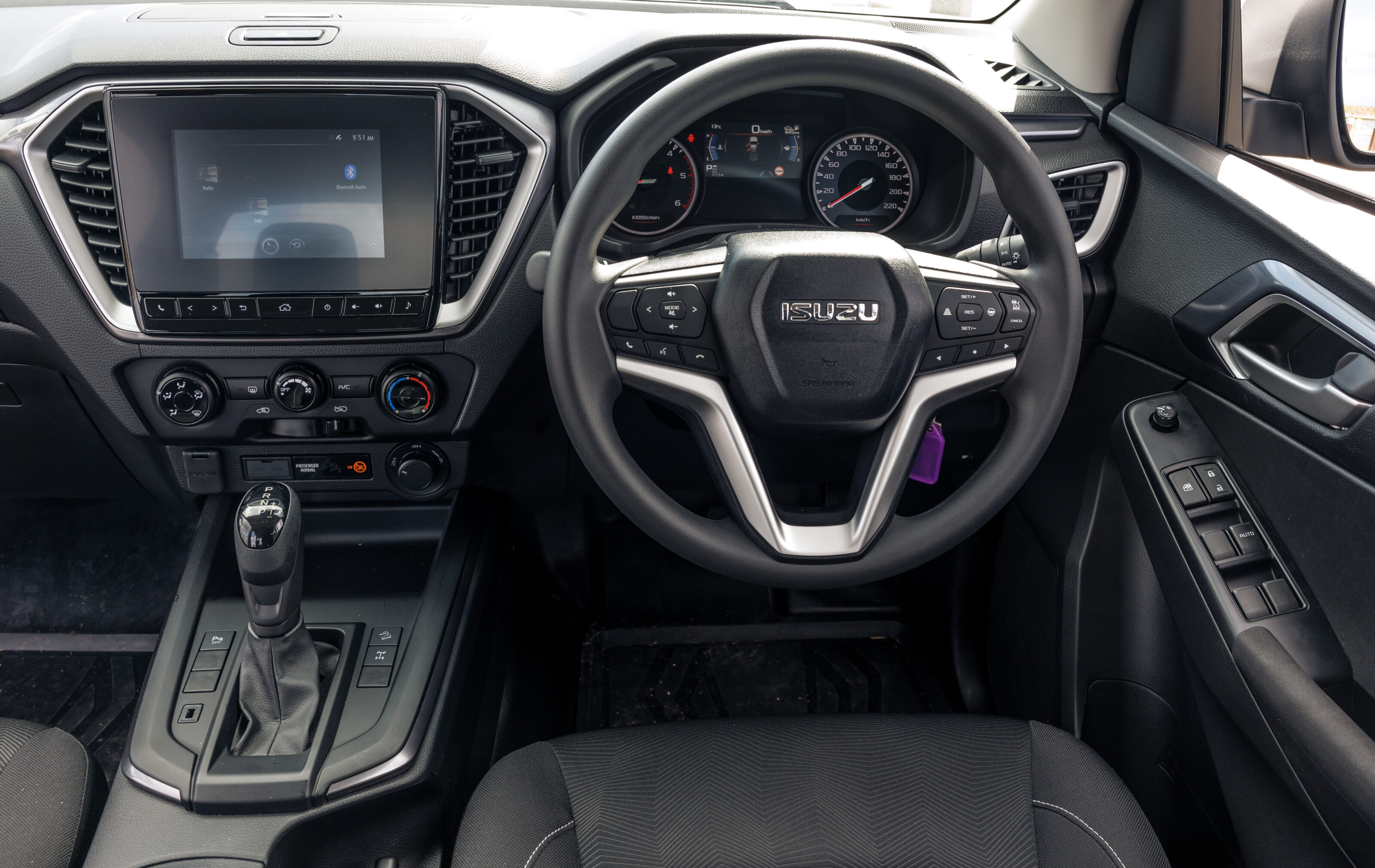
Combined with an easily washable vinyl floor, the cabin feels rugged and durable. One imagines that the LS-M would be well-suited to private buyers with an active outdoor lifestyle, or for family buyers where the ute must earn its keep at the worksite during the week, and is tasked with lugging sporting equipment and bicycles on the weekend.
Presentation aside, functionally speaking, the D-Max does a good job of front-row comfort, with supportive wide-set seats and good amounts of adjustment to be found in the driver’s seat and steering column.
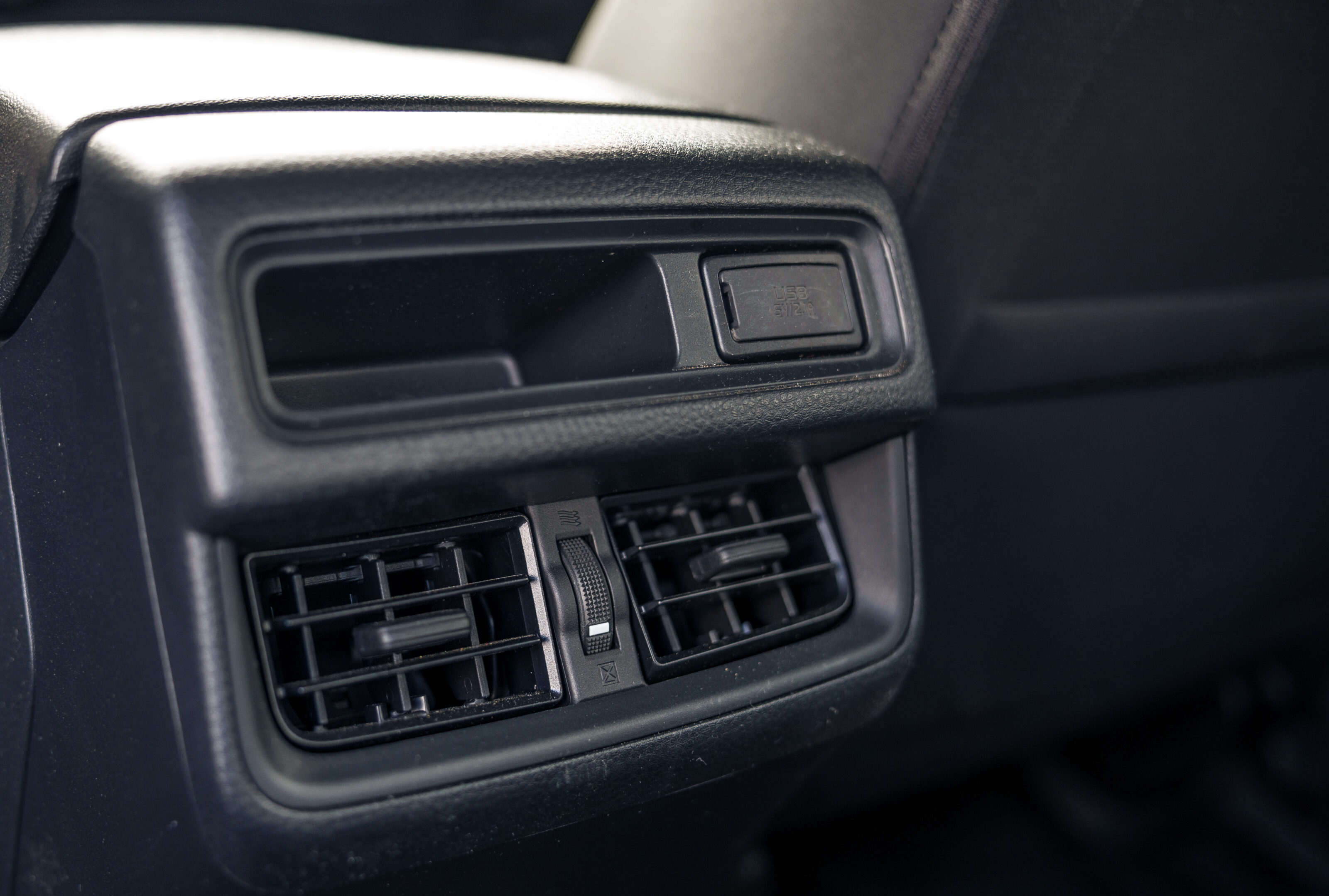
Storage is well catered for, with deep pockets in each door that are capable of holding large drink bottles, two glovebox compartments and a tray in front of the gear shifter.
Second-row occupants are treated to good levels of headroom, even for taller folk, and decent knee room. The air-conditioning offers just single-zone adjustment, but its air vents welcomely extend to the second row.
What’s the payload like and is the tray practical?
The Isuzu D-Max’s payload is 1070kg in LS-M Crew Cab ute guise with automatic transmission as tested here, and the tub measures 1495mm long, with 1122mm between the wheelarches and a depth of 490mm.
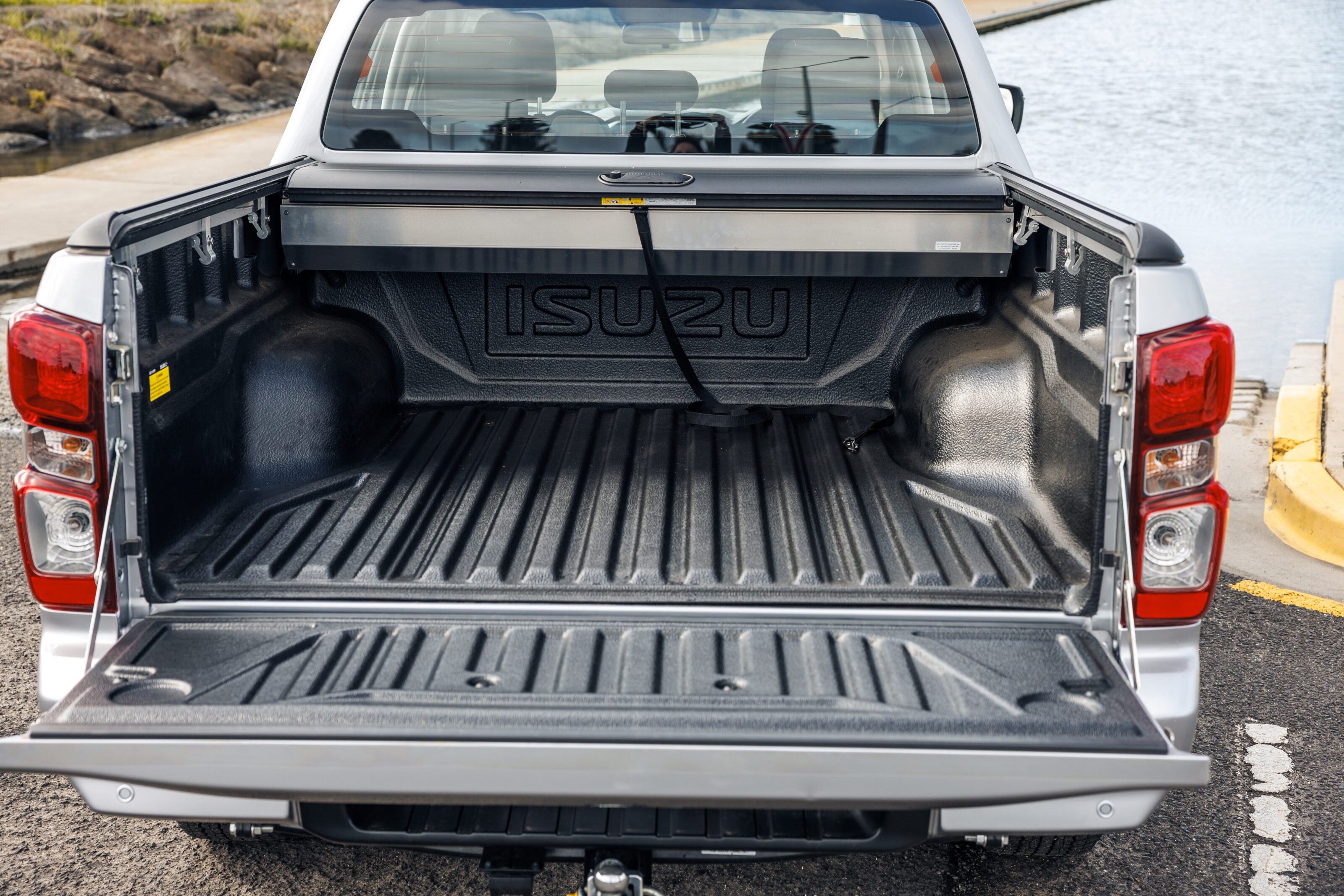
Our vehicle’s optional hard roller tonneau cover is a nicety for keeping stored items away from prying eyes, but the mechanism does impinge significantly on rear tub space.
This D-Max also bears only two integrated tie-down points, both mounted towards the rear of the tray, which is down against many contemporary dual-cabs.
What’s it like for towing?
The D-Max wears an official braked tow capacity of 3500kg, with a gross combination mass of 6000kg, and is more than suitable for towing a trailer, caravan or small boat.
Its six-speed automatic transmission can be a little too quick to shift into higher gears; a good calibration for efficiency but with a tendency to fall out of its power band when pulling a load. A manual override feature makes light work of selecting the ratio you want, however.
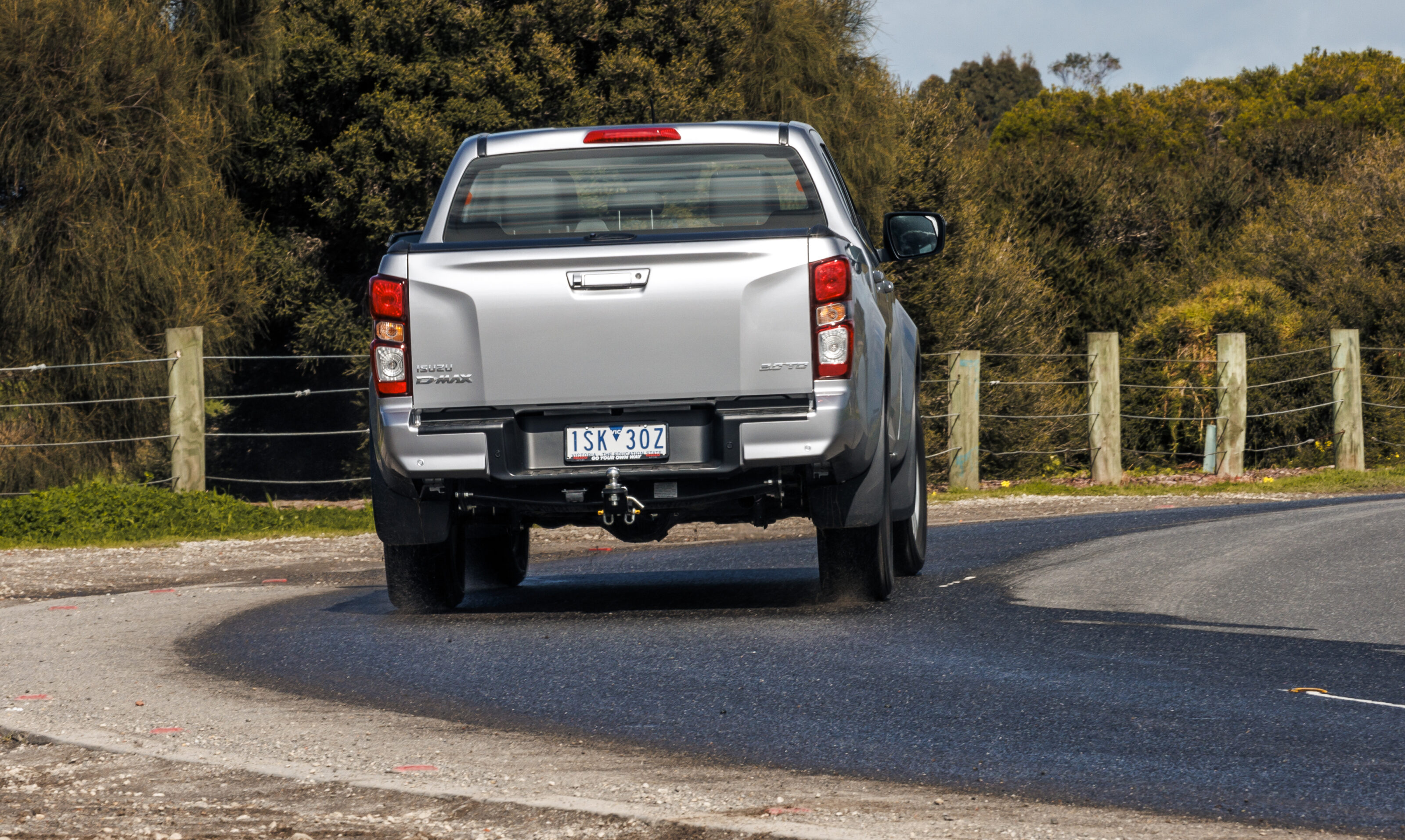
A firmer suspension tune, compared to Mazda’s BT-50, can deliver a rough and busy ride when unladen but comes into its own when towing.
Prior testing from our dual-cab ute megatest shows the Isuzu D-Max to return a fuel consumption figure of 15.3L/100km during the towing assessment when hitched to a 6.1-metre, 2100kg caravan.
What’s it like to drive?
The Isuzu D-Max LS-M delivers a respectable on-road driving experience given its keen value position and off-road prowess.
Its 3.0-litre diesel is torquey and responsive, its torque delivery swelling to the full 450Nm between 1600 and 2600rpm – with a sweet spot around 2000rpm – and peaking with 140kW at 3600rpm.
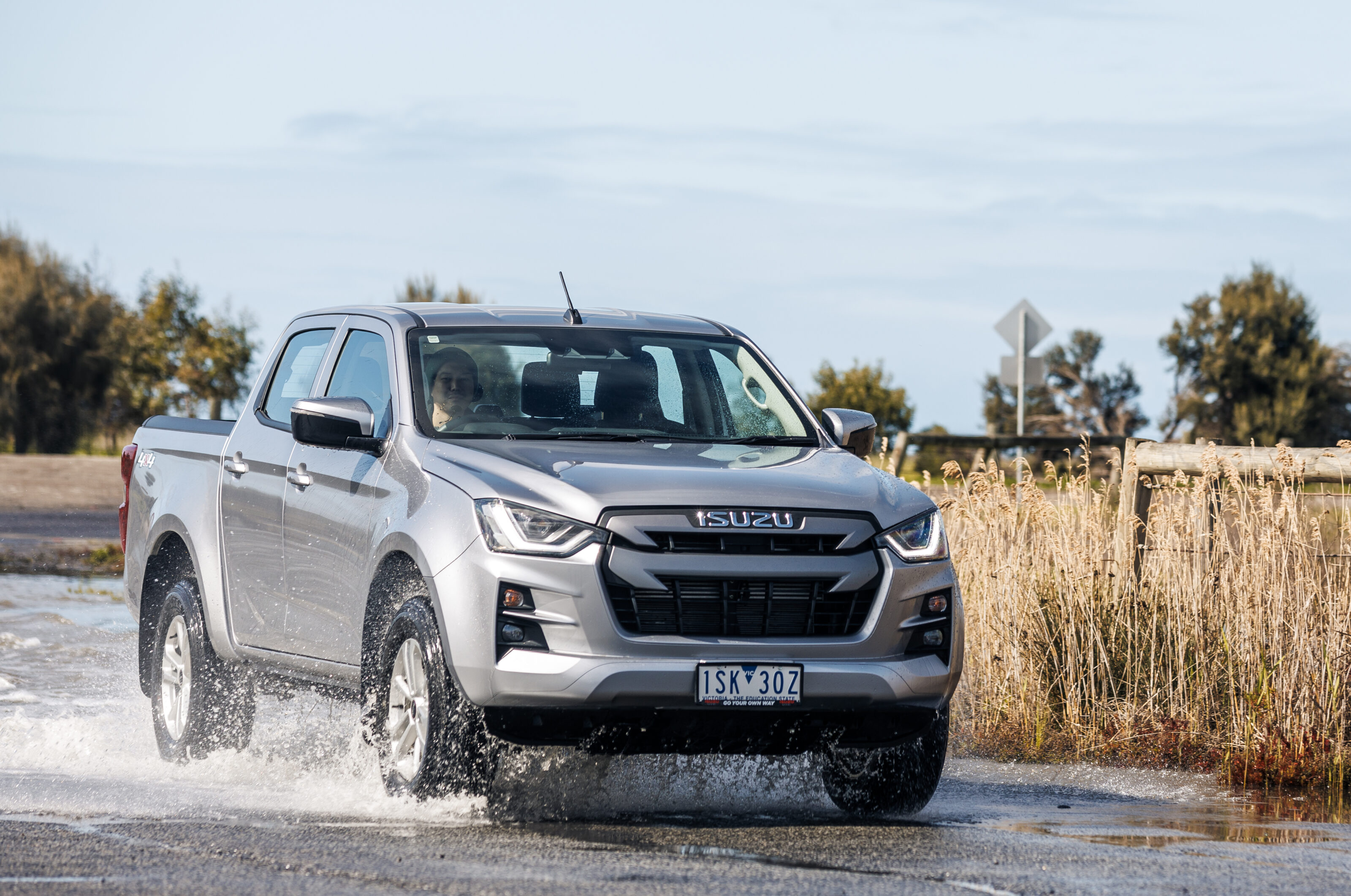
The turbo-diesel is well-matched to the six-speed auto’s ratios, but again its calibration can be a little too keen to settle into higher gears, with uphill instances frequently requiring a manual downchange, or for you to stick the boot into the throttle to force the efficiency-minded software to change down.
Steering is nicely weighted and cuts the line between urban ease, high-speed predictability and low-speed precision. The wheel itself has a chunky profile and feels wonderful in the hands.
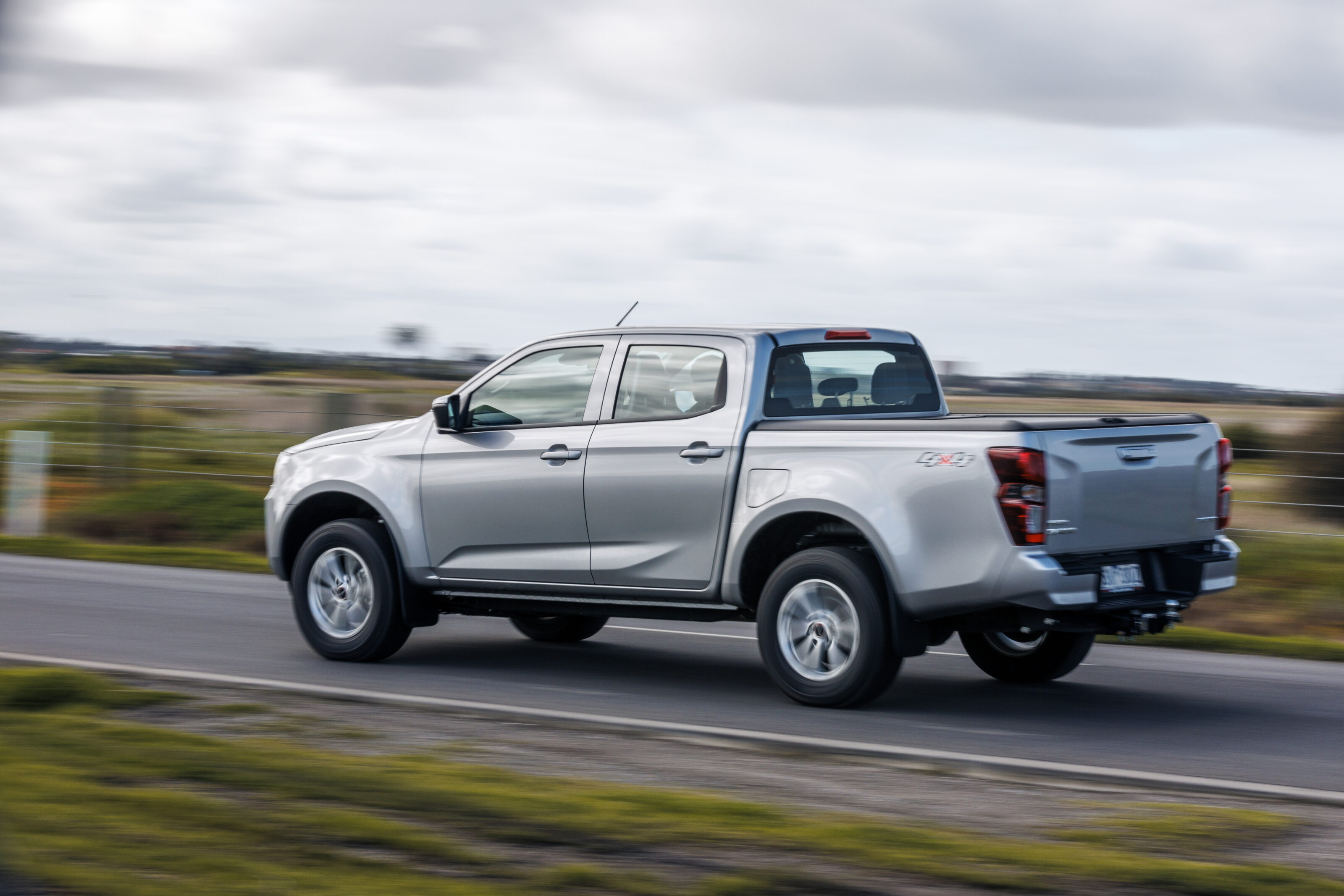
A rather firm suspension tune can deliver a terse and busy ride over subtle road corrugations but the D-Max delivers respectable levels of refinement around town. Its Bridgestone Dueler H/T tyres do an admirable job of containing road noise in the wet and dry.
How is it on fuel?
Our testing shows the Isuzu D-Max registering fuel use of 9.65L/100km when driven on a mixture of highway, country and unsealed roads.
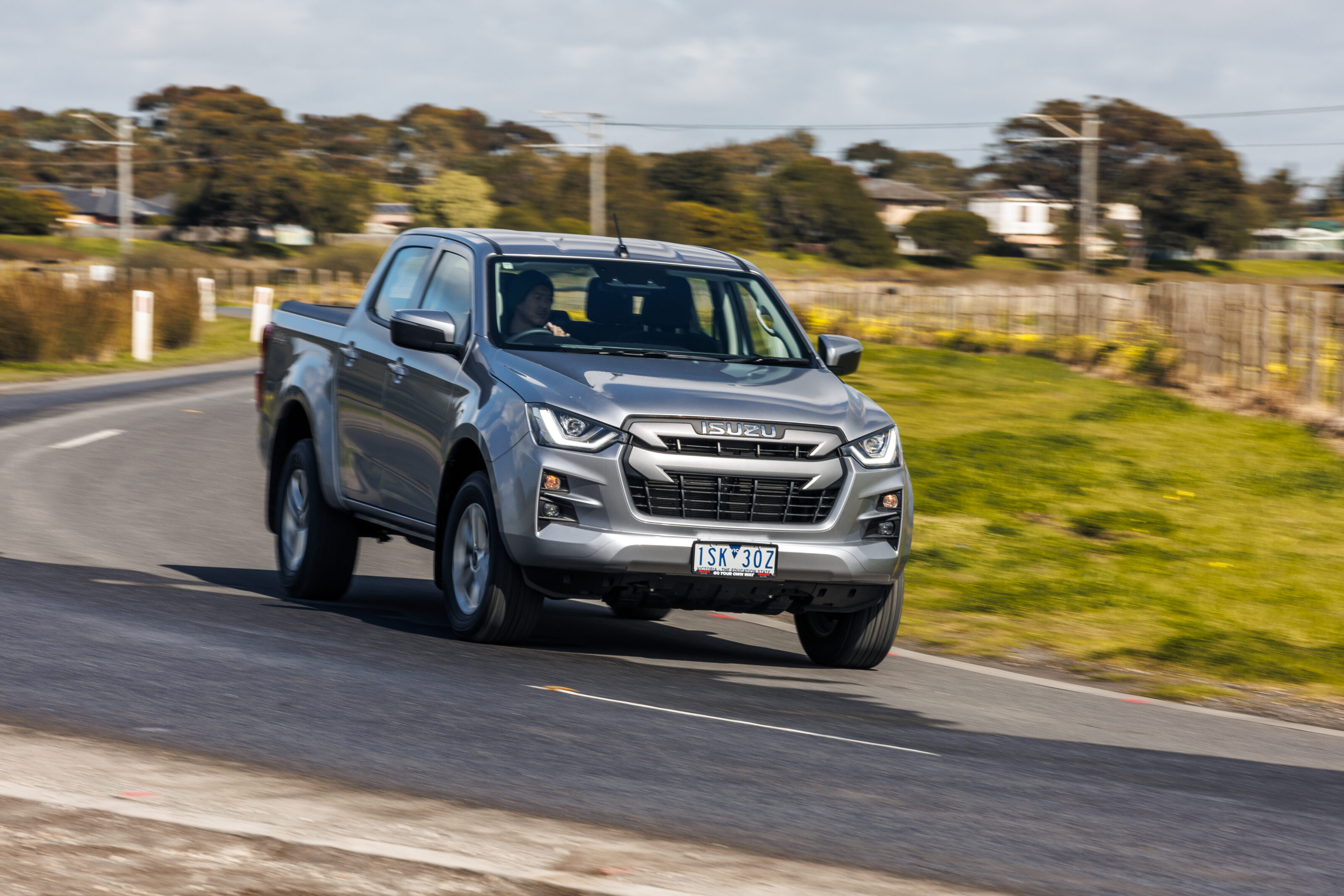
How safe is it?
The current-generation Isuzu D-Max was assessed by ANCAP in 2020, achieving a five-star rating.
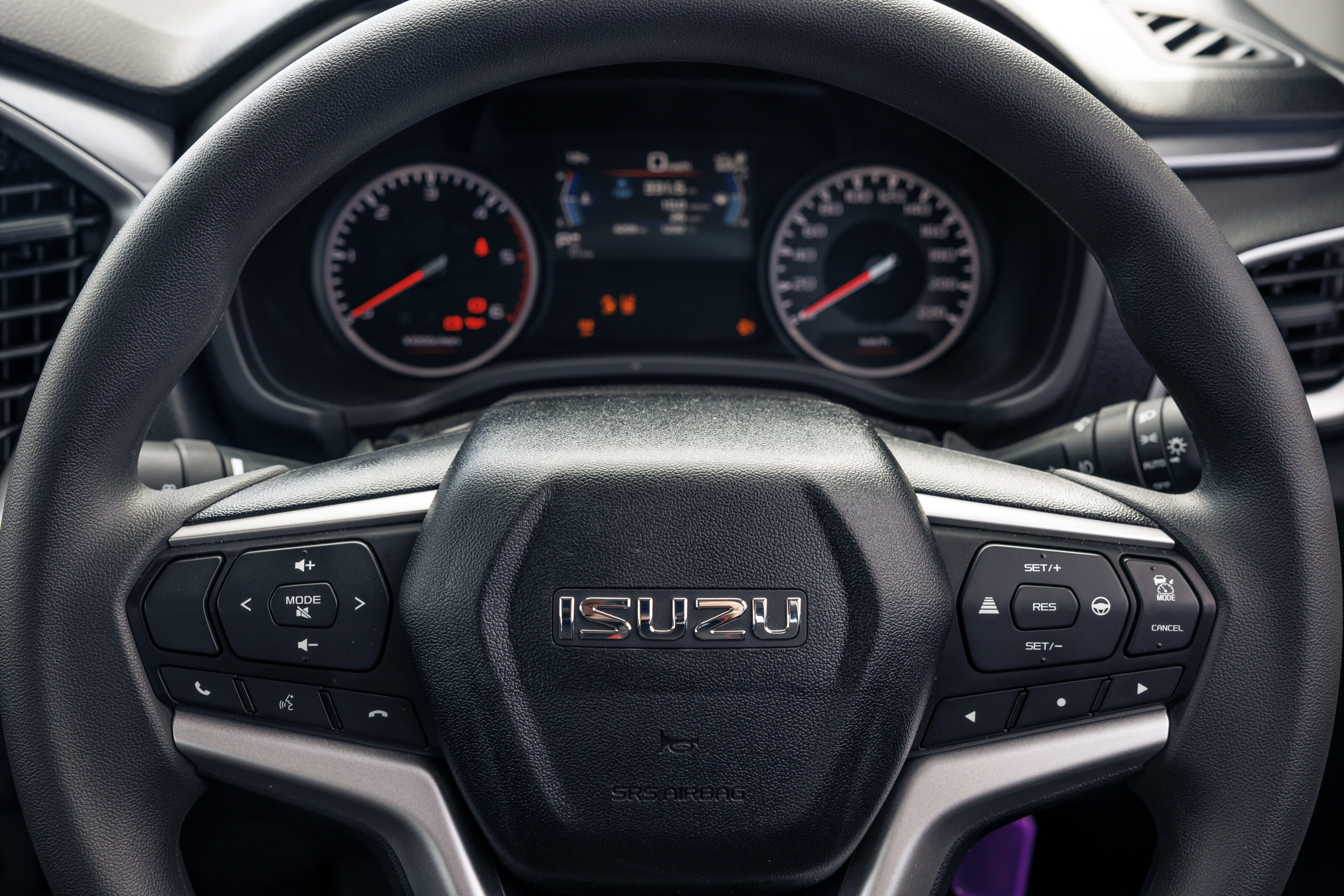
Standard safety features are generous across the range and among the class best, including autonomous emergency braking, adaptive cruise control, lane departure warning and prevention, lane-follow assist, rear cross-traffic alert, speed assist (with traffic sign recognition), rear parking sensors, blind-spot monitoring and a reversing camera.
Warranty and running costs
Isuzu Ute Australia provides all models with a six-year, 150,000km vehicle warranty – one year greater than the mechanically identical Mazda BT-50, although that runs to unlimited kilometres.
Seven years of roadside assist and seven years of capped-price servicing are also included with a new D-Max sale.
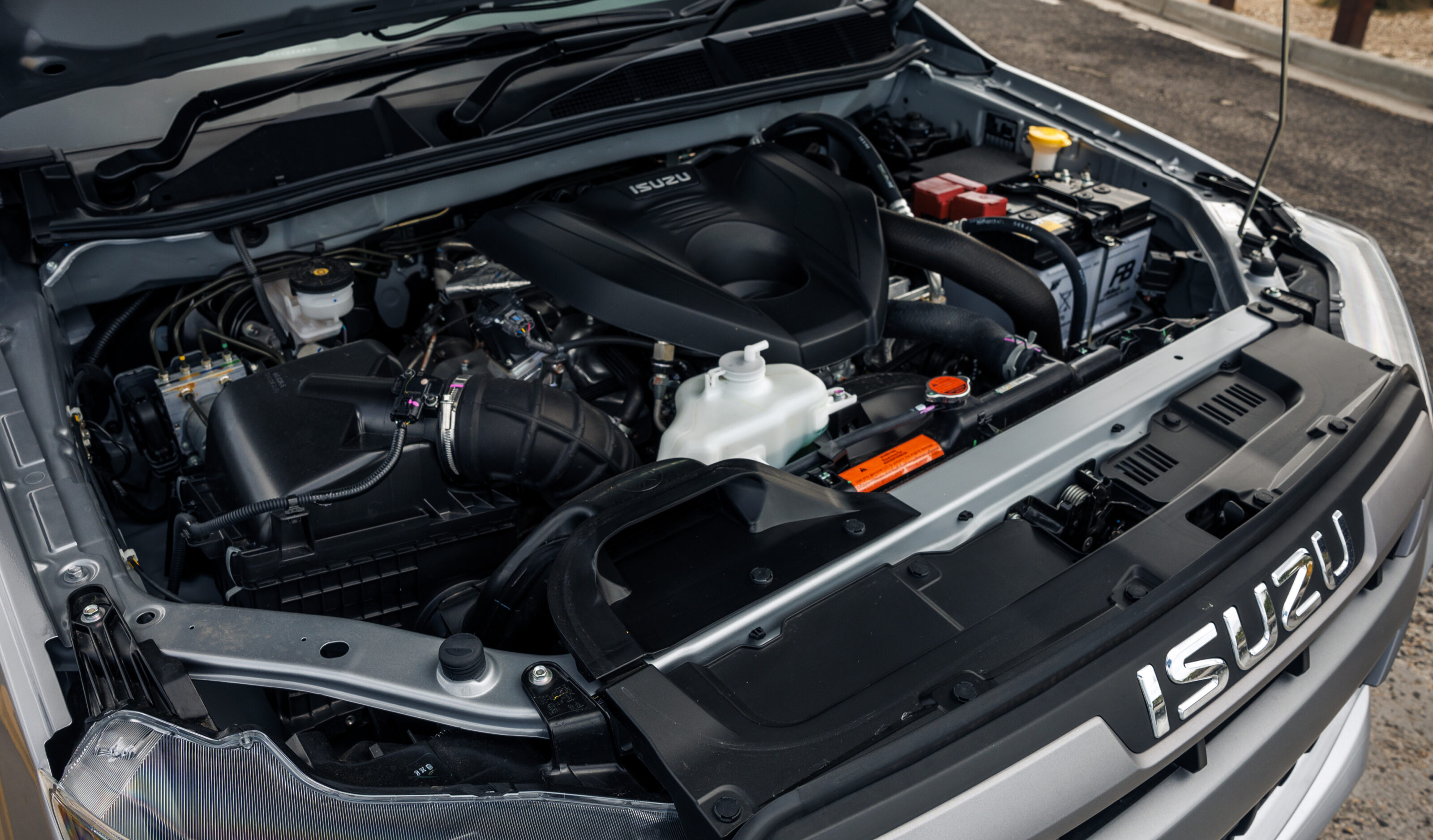
Service intervals run annually, or every 15,000km, whichever occurs first. At the time of writing, capped servicing costs ranged from $335 to $799 depending on interval, adding up to $3689 over the first seven visits at an average price of $527.
What about the 2023 update?
Starting from December 1, a lightly updated D-Max will be available in Australia as an MY23 model. Prices will remain unchanged from the current MY22 models but the dual-cab gains new alloy wheels, a redesigned front grille, new trim and paint finishes, and a tailgate gas strut for less abrupt opening and closing.
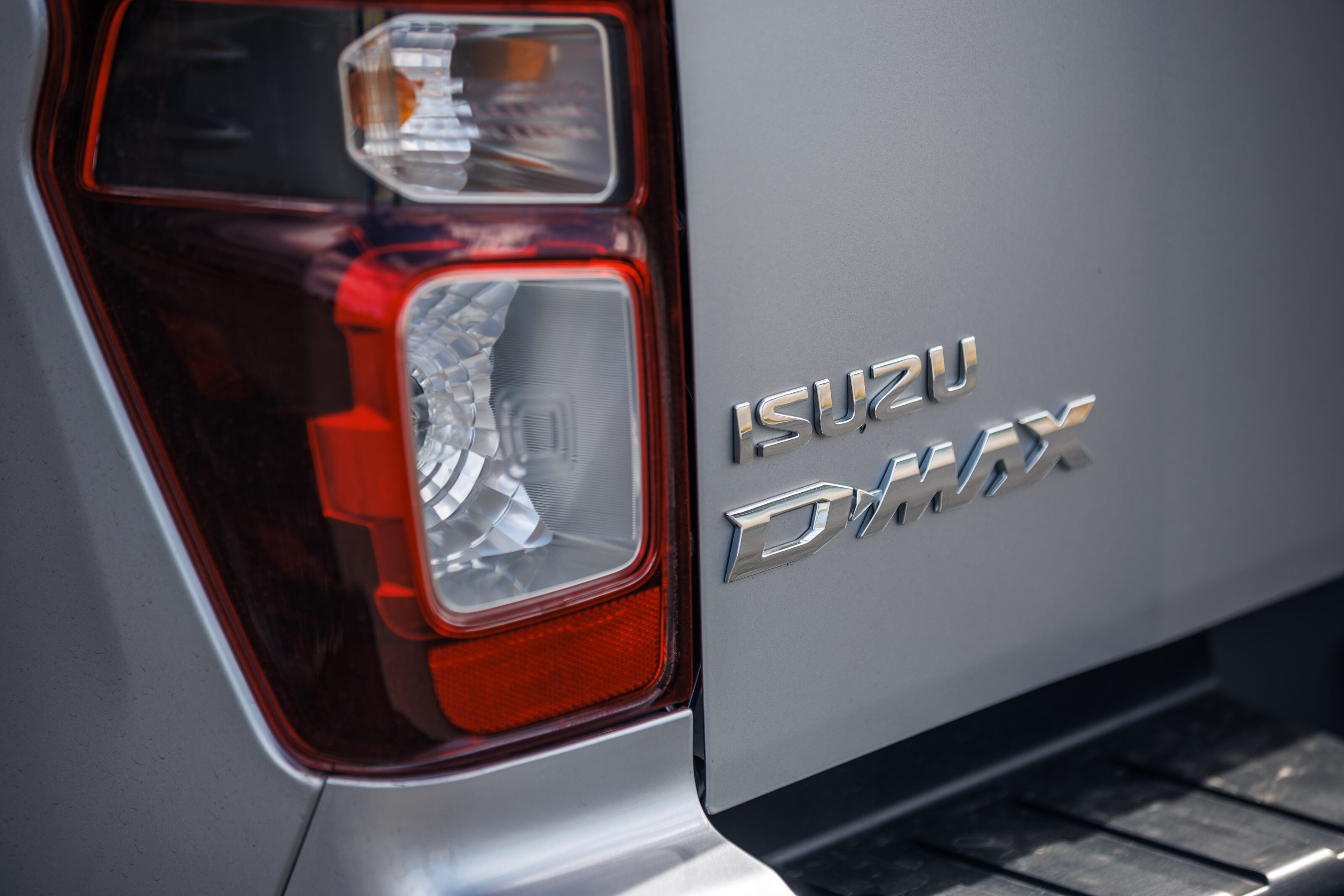
Other feature additions for MY23 include auto-off blind-spot monitoring and rear-cross traffic alert when a towing connector or plug is detected.
Those who own an MY22 D-Max will be able to have their vehicles retrofitted with these features, but will incur a cost for replacement parts and labour.
VERDICT
The Isuzu D-Max LS-M is an admirable Jack-of-all-trades, delivering an adventure-ready package with respectable on-road manners for an attractive price.
As upmarket dual-cabs seem to continue to grow in aspiration for buyers, the humble D-Max LS-M won’t impress with any diamond-stitched upholstery or imposing bull bars but offers genuine worksite utility blended with creature comforts you’ll appreciate daily and a very generous standard safety suite.
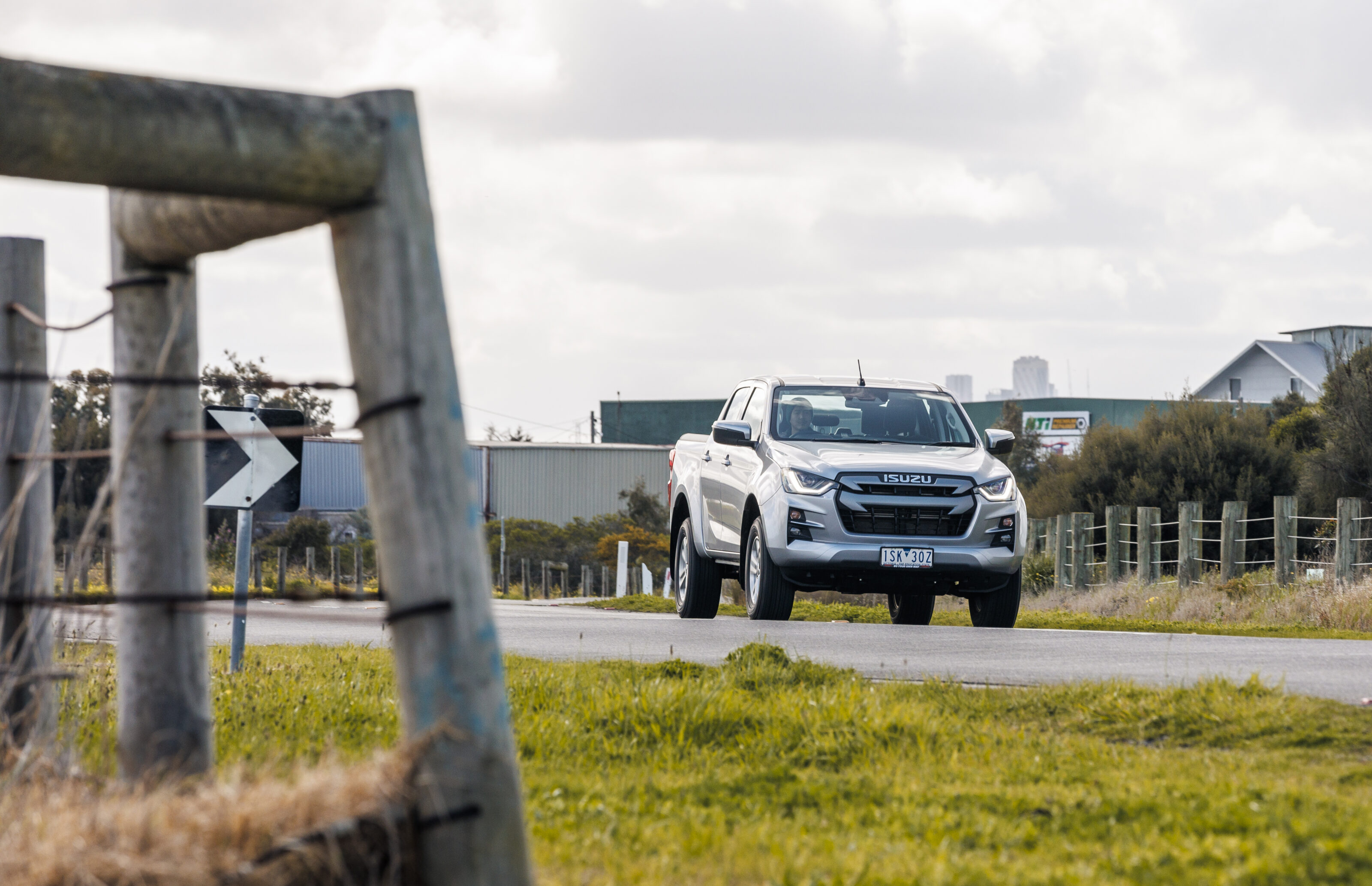
As a family ute that goes to work during the week, or as a weekend toy that’s ready to get down and dirty, if you’re shopping for a capable mid-$50K dual-cab ute, this is one well worth checking out.
2022 Isuzu D-Max LS-M specifications
| Body | 4-door, 5-seat, ute |
|---|---|
| Drive | All-wheel |
| Engine | 3.0L turbo-diesel, inline-six |
| Max power | 140kW @ 3600rpm |
| Max torque | 450Nm @ 1600-2600rpm |
| Transmission | Six-speed automatic |
| Fuel consumption | 9.65L/100km |
| Weight | 2020kg |
| L/W/H/W-B (mm) | 5265/1870/1785/3125 |
| Price | $55,300 |
| On sale | Now |
Score breakdown
We recommend
-
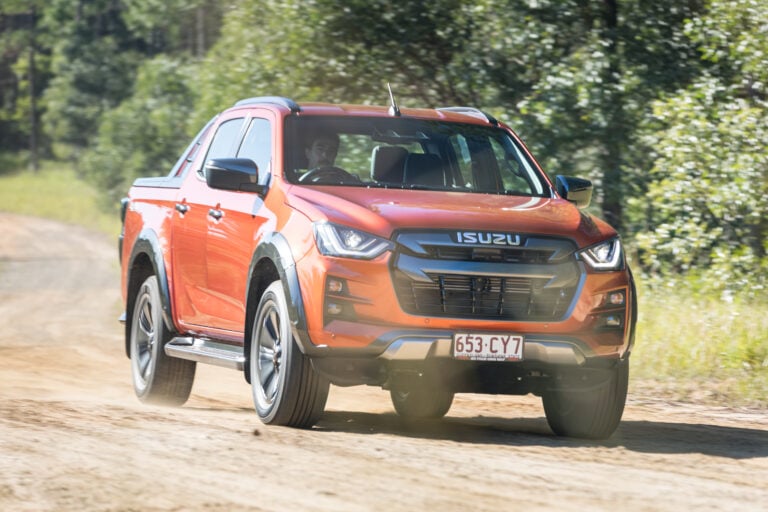 Reviews
Reviews2022 Isuzu D-Max X-Terrain review
Isuzu’s top of the line X-Terrain ute shows off with plenty of off-road focused design flair while retaining everyday liveability.
-
 News
NewsNew car calendar 2026: All the new cars coming to Australia next year
Here’s the WhichCar by Wheels guide to all the new cars that will launch in Australia in 2026. Check back in regularly for updates...


